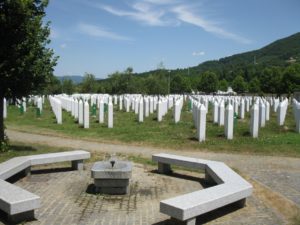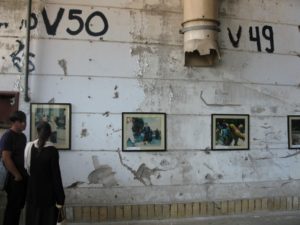Lisa Ghali, a Restoring Family Links caseworker for the American Red Cross, had the opportunity this past July to visit Srebrenica, Bosnia & Herzegovina, the site of one of the worst genocides in Europe’s history.
We take the bumpy, winding road from Sarajevo and draw closer to the village of Srebrenica. It is eerily quiet as we pass by dilapidated and bullet ravaged homes that line the narrow roadway. I feel a sense of urgency in the car as the two women accompanying me begin preparing themselves to visit their sons’ and husbands’ graves; shawls cascade over their heads and their sleeves fall down to their wrists. I take my cue and awkwardly twist my scarf over my head.
Walking through the gate to the Memorial and Cemetery of Srebrenica, we are immediately faced with thousands of white grave markers lining the hills, indicating those who have finally been identified and laid to rest. In just a few days time, another 520 green caskets will arrive here. The families will finally have some closure as they see their loved ones put to rest during the memorial day of the massacre’s anniversary on July 11.

As we stand before the grave of one mother’s son, she begins to cry in a voice I’ve never heard her use before. She has a piercing intonation and is gesturing her hands up and down towards the sky. All I can think to do is walk towards her, quietly conveying my empathy by standing in silence with her. She relives the moment with me — her son, just 14 years old, was brutally ripped apart from her as she clung to him. Her last glimpse of him was at that moment, until the butt of the gun blackened her image. She recalls how his cries are frozen in her mind. The child now lies before us, marked by a headstone. I take in a deep breath as I realize he was born the same year as me.
My head swims with thoughts about the son who would’ve been a young man today; my exact age. What would he have looked like? What would he have done with his life? Would he have made his mother proud?
The women beside me have suffered an unimaginable loss from a war of religious and ethnic clashes where once Muslim, Christian, Jewish, and Eastern Orthodox people all lived side by side. The irony is not lost on me that I am alive and standing here because my father, a Coptic Christian in Egypt, escaped a world in which he was persecuted because of his religious beliefs. The idea is a powerful reminder of my position as a Red Cross caseworker and why I am so passionate about my job — to connect families separated by war and disaster. War affects everyone involved; the humanitarian work we do transcends religious, ethnic and geographic boundaries to provide assistance to the families that need it most. Standing here with these women, I see only the tragic and human side of war. I feel their pain and I want nothing more than to help them heal.

Continuing across the street we are led to the former UN Peacekeeping building where the massacre began. Empty spaces replace what were once windows and paint cracks under the stress of large bullet holes. I can picture the tragedy unfolding here as my eyes adjust to the dim light. Across the walls I see the biographies and personal items of people who perished here. As my eyes focus on these images I am struck by a very familiar item: a Red Cross Message. These messages are circulated around the world so that people in refugee camps, such as this one used to be, can receive news of their loved ones. Seeing this message here, instead of in our offices awaiting distribution, is a heartbreaking but encouraging reminder of our work, the families we serve, and our shared hope for resolution.
